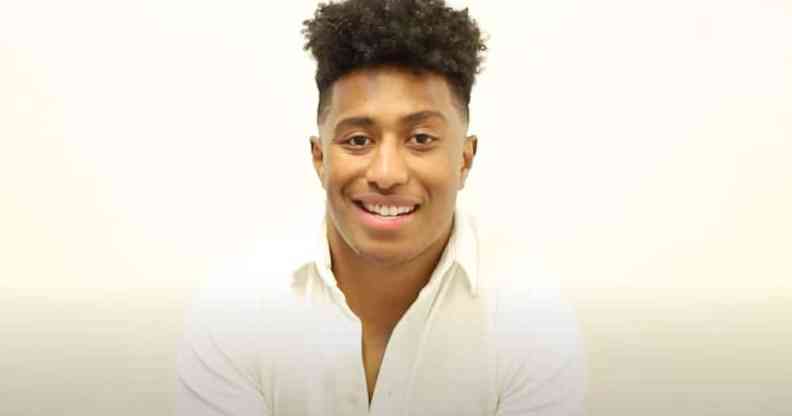Brave rugby star Ellia Green makes history as first Olympian to come out as a trans man

Ellia Green came out as trans in a pre-recorded video. (Screen capture via YouTube)
Australian rugby league player Ellia Green has become the first Olympian to come out as a trans man.
Green, a gold medal Olympic champion, came out during a summit held by the LGBTQ+ rugby championship Bingham Cup on Tuesday (16 August) in Ottawa, Canada.
“I promised myself that when my rugby career ended, I would continue to live the rest of my life in the identity and the body that I that I know I am meant to be in,” Green said in a pre-recorded video shown at the international summit on ending homophobia and transphobia in sport.
Coming out at a time when sporting bodies are banning or restricting trans athletes will come with its challenges, the rugger admitted. But he knows just how powerful doing so will be.
“Being open about my gender identity is a really difficult thing to do these days. All you have to do is turn on the TV, look on social media platforms, and you can see the amount of bullying, harm and discrimination that goes on about gender identities,” he said.
“It’s extremely harmful, so for someone to be open and honest about their identity to the public eye is absolutely daunting.”
Green, 29, represented Australia in women’s rugby sevens and won gold at the 2016 summer Olympics in Rio de Janeiro and silver at the 2018 Commonwealth Games. He retired from the game in 2021.
But other trans ruggers may never be able to have the career Green had if some rugby leagues get their way. Both World Rugby and International Rugby League have barred trans women from women’s matches, joining the likes of the Swimming Federation (FINA), FIFA and World Athletics.
“Imagine not being able to do what you love because of how you identify, banning transgender people from sport, I think is disgraceful, and I think it’s hurtful,” Green said.
“I think that the alarmingly high rates of suicide and the mental health challenges which trans and gender diverse youth experience will get even worse.”

Ellia Green (L) and his wife, Vanessa Turnbull-Roberts, and daughter Waitui. (Ellia Green)
The avalanche of trans sports bans isn’t even something rugby players themselves support. Research presented at the Bingham Cup’s summit found the majority of rugby-playing women support the full inclusion of trans women, rather than on a case-by-case basis or a blanket ban.
Nearly nine in 10 straight, rugby-playing cis women in Canada support trans-inclusive sports, with 80 per cent saying they would feel perfectly safe playing alongside a trans woman.
The research, conducted by the University of British Colombia and Monash University, surveyed seven rugby clubs in Canada and 14 clubs in Australia and Britain.
“We are very concerned about the health of trans and gender diverse young people and need to do everything possible to support them, not ban them from playing sports,” said Elizabeth Saewyc, a University of British Colombia professor and one of the study’s researchers.
Growing up in Fiji before moving to New South Wales, Australia, Green said he spent his childhood knowing he was a boy. “I always used to wear my brother’s clothes, played with tools, and ran around with no shirt on. Until I grew breasts, and I thought ‘oh no’,” he told the Associated Press.
Greene now lives in Sydney with his wife Vanessa Turnbull-Roberts and their infant daughter Waitui. He said he was “in and out of mental health facilities for serious issues” while Turnbull-Roberts was pregnant, shortly after his retirement.
“I was having bad episodes. That’s the last time I want her to have to see me like that. But the only way to help heal is to talk about it,” he said.
“I’d like to help someone not feel so isolated by telling my story.”
In 2020 Chris Mosier became the first openly trans man to represent the US internationally and qualify for the racewalking Olympic trials. But he never made it to the Olympics due to an injury.
But a whole host of openly trans athletes have gone on to compete in the Tokyo 2020 summer Olympics, with many making history in the process.
Laurel Hubbard, a weightlifter from New Zealand, became the first-ever openly trans athlete to compete at the Olympics. Canadian non-binary footballer Quinn scored an Olympic medal in the women’s football final, the first openly trans athlete to do so.

